Survivor Calls For Change In How Churches Respond To Abuse Allegations
In early January, a Tennessee pastor who stood accused of sexual assault received a standing ovation from members of his evangelical Christian congregation after confessing to a “sexual incident” with a woman 20 years before. Now, the woman who went public with her allegations against her former youth pastor is again speaking out about her experience, this time urging American churches to more fully reckon with their responsibility to sexual assault victims.
“We as a church, of all places, should be getting this right,” Jules Woodson said in a New York Times op-ed video published on Friday. “It’s unfathomable to me that the secular world, Hollywood, are taking a stand. The church should have been the first group to stand up and say, ‘We will not allow this.’”
Woodson came forward in January with allegations against her former youth pastor, Andy Savage. She claims that when she was 17 in 1998, Savage drove her to a private location after a church event in Texas and forced her to perform sexual acts. She said church leaders at Woodlands Parkway Baptist Church (which later changed its name to StoneBridge Church) urged her to keep quiet and promised the church would take care of the matter internally.
Savage later moved to Memphis, where he eventually became a pastor at Highpoint Church.
After Woodson came forward with her story in January, Highpoint Church initially said that it had “total confidence in the redemptive process” Savage went through after he allegedly assaulted Woodson. Savage was placed on leave after the church received backlash in the national media ― one critic called the congregation’s response, which was streamed online, the standing ovation “heard round the world.” Savage said during his apology that he told Highpoint’s lead pastor about the incident before coming on board as staff.

The New York Times filmed Woodson’s reactions to a video recording of Savage delivering his apology at Highpoint Church. Woodson criticized the apology, pointing out that Savage called what happened to her a “sexual incident” and repeatedly referred to the fact that it happened decades ago.
“I was and remain very remorseful for the incident and deeply regret the pain I caused her and her family as well as the pain I caused the church and God’s kingdom,” Savage said during his apology. “My repentance over this sin 20 years ago was done believing that God’s forgiveness is greater than any sin. And I still believe that.”
Woodson was in tears as she spoke in the op-ed video about the alleged crime and her church’s response.
“I looked up to him. I trusted him,” Woodson said about Savage in the video. “What happened was a crime. This is not something that the church should handle internally.”
“I want our churches to change how they handle sexual assault,” she added. “Sexual assault in the church. It’s a crime, not just a sexual sin.”
Woodson’s words echo the reflections of other survivors of sexual abuse in Christian communities. Inspired by the Me Too movement, survivors have used the hashtag #ChurchToo to share stories of abuse that happens in church settings.
Hannah Paasch, one of the founders of #ChurchToo, claims that a culture of purity in evangelical church settings has created the ideal of a “gentle and quiet” woman who accept the authority and leadership of men.
“The stories that have poured in through the hashtag prove to me that the evangelical church, in its current iteration, actively supports the confessing abuser over the victim and, in the name of ‘having no appearance of evil,’ has managed to silence thousands of sexual and physical abuse allegations throughout the years,” Paasch wrote in an op-ed for HuffPost.
Historian Neil J. Young, who studies the religious right, wrote that evangelical churches often tend to place the abuser at the center of the story, making the priority “forgiveness for his sins rather than justice for her injury.”
“It is his words of confession and embarrassment, but also often rationalization, that a church body gathers together to hear on a Sunday morning, not her cries of rage and pain that they must confront,” Young wrote in an op-ed for HuffPost. “If #MeToo has been about breaking the silence, the evangelical response has been to allow the abuser’s voice to fill the void.”
Highpoint has initiated two investigations into how the church handled the allegations against Savage, and whether its current policies are sufficient to safeguard the safety of children. On March 4, the church released a statement saying that the investigation was “wrapping up” and that its initial findings “give us assurance that we can begin the long process of moving forward as a church.”
Highpoint did not respond to HuffPost’s request for comment.
“Just as the culture around us is waking up to the suffering expressed by the courageous voices of the #metoo movement, we are taking very seriously our commitment to fully understand how our church should minister to the needs of the people we impact,” the church wrote on its website.
Also on HuffPost
Rev. Jennifer Bailey
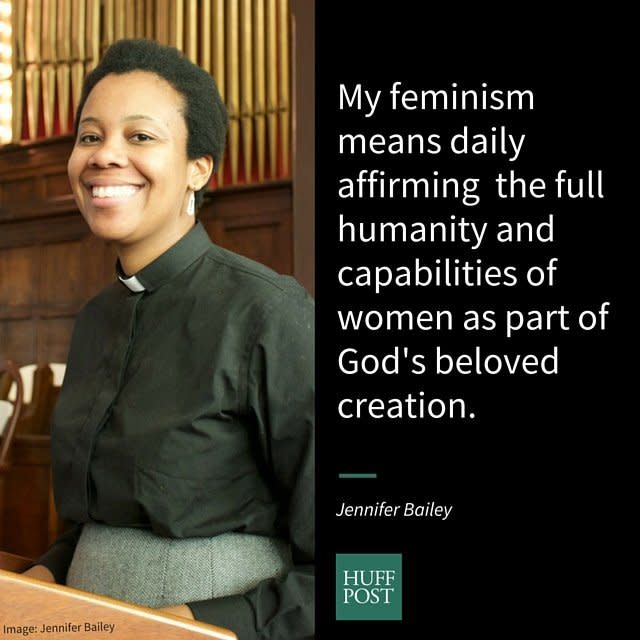
"As a Christian leader, my feminism means daily affirming the full humanity and capabilities of women as part of God's beloved creation and their sacred work in the world. It also means honoring the sacrifices, courage and labor of the many female saints of God that it made it possible for me to wear my clerical robe and preach the gospel of Jesus. Historic figures like Jarena Lee, Harriet Tubman, Sojourner Truth and Bishop Vashti Murphy McKenzie paved the way for me as did the unsung (s)heroes and everyday church mothers whose work has kept the church alive and flourishing since its inception. We still have a long way to go to completely shatter the stained glass ceiling but the ancestors have shown is it is possible by holding to God's unchanging hand. Blessed be her Holy Name."
Sarah Bessey
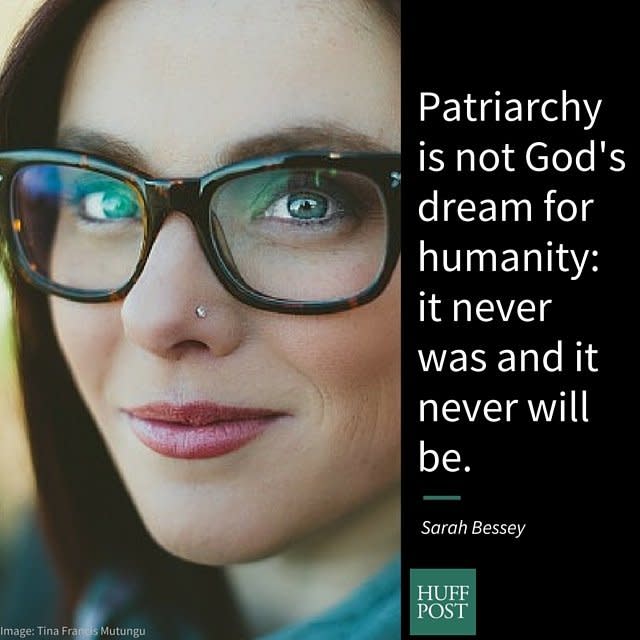
"It was following Jesus that made a feminist out of me! That discipleship lead me to caring about everything from maternal health in Haiti to sexism in the Church as issues of justice close to God's heart. Patriarchy is not God's dream for humanity: It never was and it never will be. I remain hopeful, too - more and more people are waking up to what wholeness and peace-making can look like for both men and women in the Kingdom of God which changes things on both a small personal scale but also helps to move the needle forward when it comes to systemic injustice, too."
Vicky Beeching
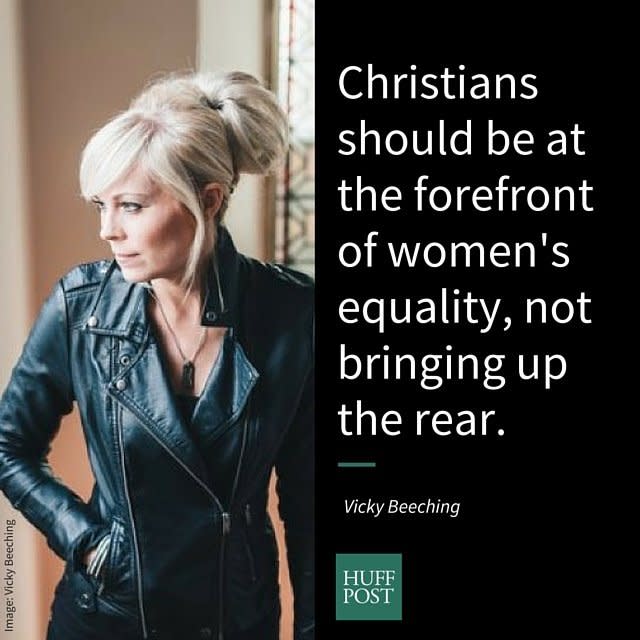
"To me, feminism means championing the rights and equality of women. Jesus treated women in ways that were truly radical for his era, so I've argued for years that Christ should be considered a feminist. The church has seemed afraid of the feminist movement, unsettled by it somehow; branding it as harsh and shrill. That seems bizarre as Christians should be at the forefront of women's equality, not bringing up the rear! Many denominations still don't let women preach, become Elders, or get ordained, so there's much work to be done. 'Christian feminism' is not an oxymoron; it's a deeply compatible, healthy response to the injustices that still exist within the faith community."
Gail Song Bantum
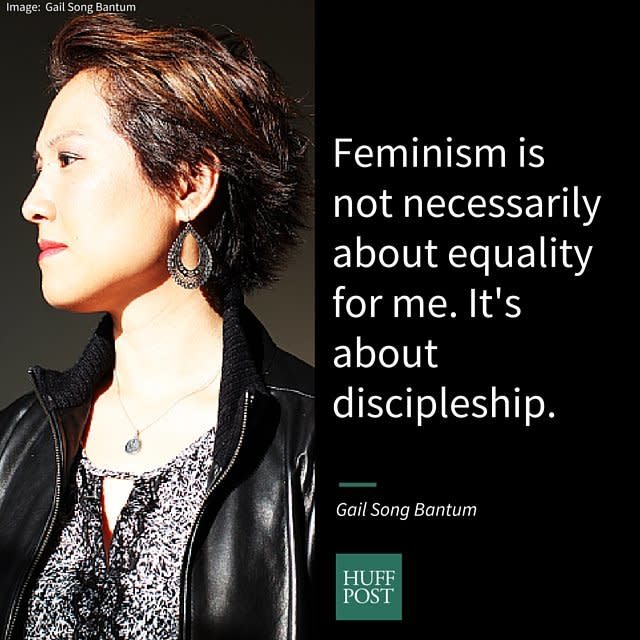
"Feminism cannot merely be an idea but a life embodied. For those of us women who have fought to live out our call in spaces of leadership within the church, we embody feminism daily whether we realize it or not. Any embrace of feminism within the church must be rooted in our deep conviction that we are all created to be free -- that it was for freedom that Christ set us free (Galatians 5:1). It is a desire for this freedom to emerge from the truth that both women and men are created fully and wholly as image bearers of God. In that sense, feminism is not necessarily about equality for me. It's about discipleship - about honoring the creativity of God in our midst, about enabling others to flourish, about fighting for another's freedom, and about submitting to the truth that we have all been gifted this breath each waking moment of the day."
Rev. Dr. Paula Stone Williams
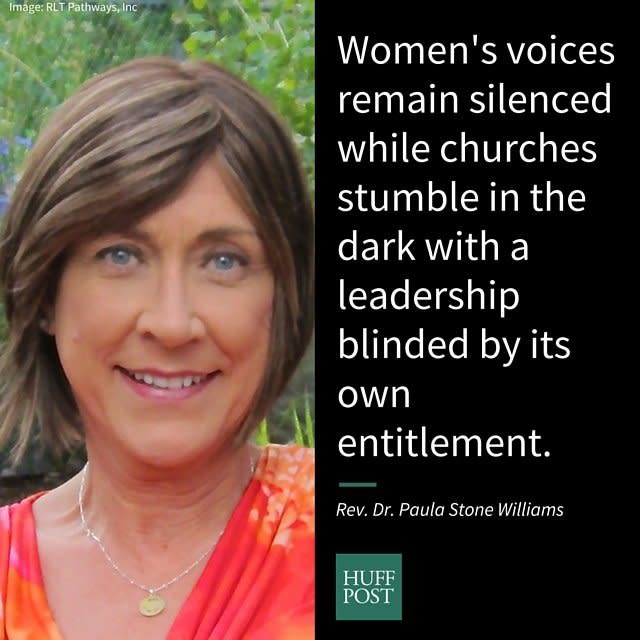
"I have preached in three of the twelve largest churches in America. Today I would not be allowed in the pulpit of a single one. Not only would I be barred because I am transgender, I would be barred because I am a woman. The irony is the things I know now make me twice the person I was before. But women's voices remain silenced while churches stumble in the dark with a leadership blinded by its own entitlement. It has made me into something I never expected I'd be -- a feminist."
Edyka Chilomé

"As a woman of color I don't identify as a feminist although I walk in solidarity with my feminist sisters and am working toward similar goals of transformative justice. I grew up in a christian context that inherited liberation theology born from third world liberation struggles and the continuous survival of indigenous mestizo peoples in the global south. My Christianity looked like rallies at the capital Sunday morning led by indigenous mestiza women who made very clear for me that God, in whatever form, is calling us to walk with the earth’s people and honor life first. This means that the world is my parish, and at the end of the day, compassion and accountability go hand and hand."
Mica McGriggs
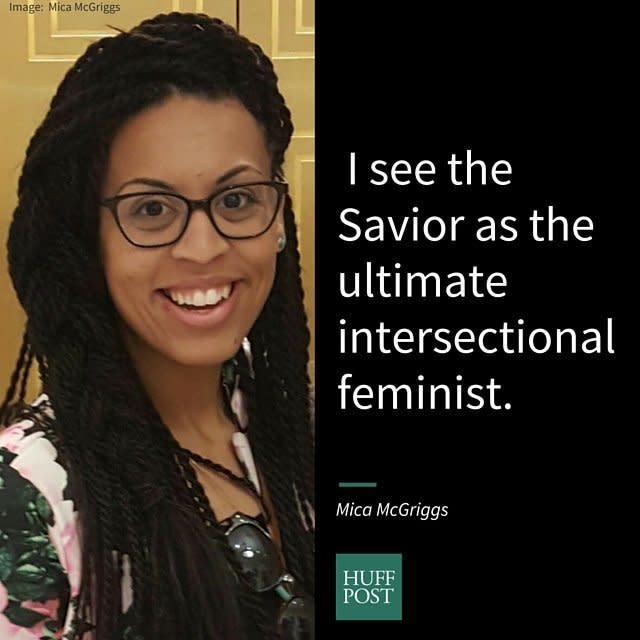
"Feminism for me as a Christian means I am working toward being more like Christ; I see the Savior as the ultimate intersectional feminist. He was always concerned and working for 'the least of these' he looked to the margins and created spaces that were inclusive to all. That is what intersectional feminism aims to do. The church would be a safer and more loving environment for all God's children if they were to embrace liberation theology and the practice of intersectional feminism."
Rev. Christine Lee
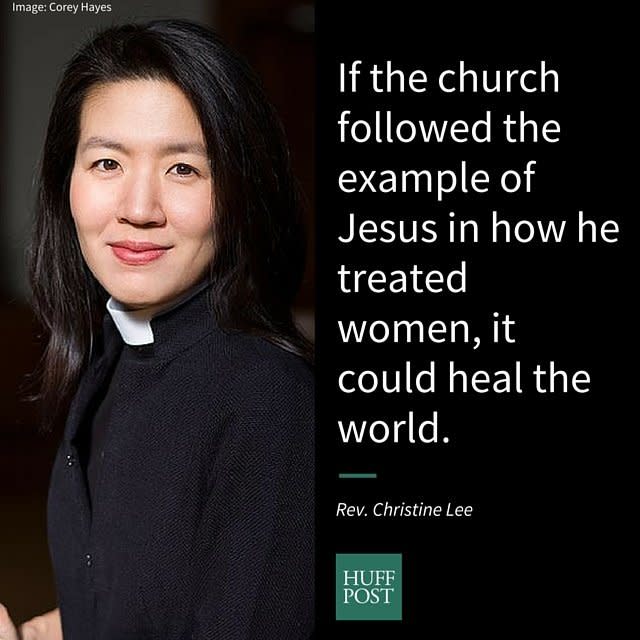
"As a Christian, to me feminism is about seeing and valuing women as Jesus did. I'm always moved by the stories of Jesus' interactions with women in the gospels. In a time and culture where women were often invisible, he saw them and treated them as ones who were honored by God and deeply loved. If the church followed the example of Jesus in how he treated women, it could heal the world. Just like the human body, the whole flourishes when every part is made stronger."
Nicole M. Garcia
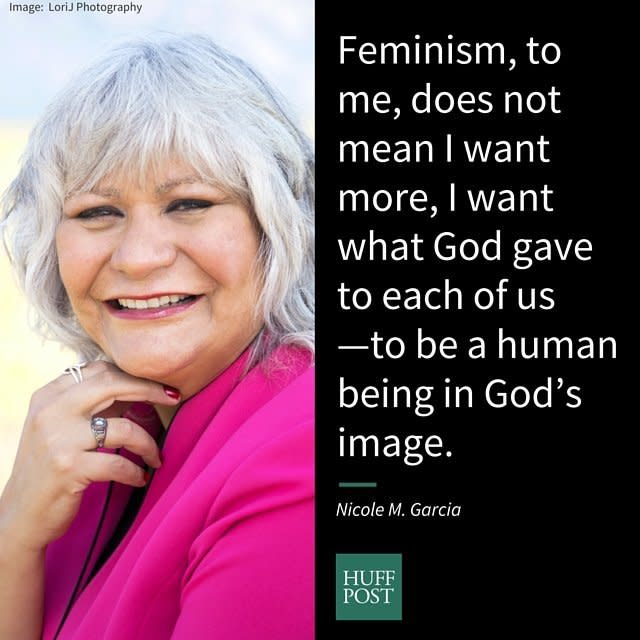
"Genesis 1: 27 is very clear: God made humankind in God’s image. Feminism, to me, does not mean I want more, I want what God gave to each of us -- to be a human being in God’s image. The church has subjugated women far too long and it is time to emphasize the love and compassion Jesus taught us in the Gospel."
Bishop Minerva G. Carcaño
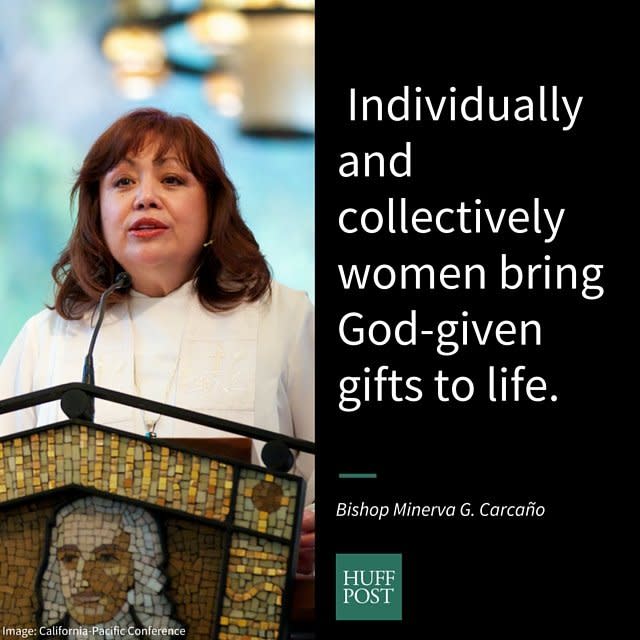
"As a Christian, I view feminism as a commitment to women having the opportunity to fully be who God created us to be. Creation itself allows us to catch a glimpse of God’s amazing creativity with all its beauty, potential and interrelationship. Individually and collectively women bring God-given gifts to life. The church has a responsibility to remind the world of the sacredness of all life including that of women. When women suffer because of discrimination due to their gender, everyone suffers through the loss of the gifts women bring to the world."
Monica A. Coleman

"For me, feminism in religion is about voice and power. It's about what I notice and what kinds of questions I ask: Where are the women in the story? Who has voice? Who doesn't? What might she have said? Who is in leadership in churches? Whose voices and perspectives have the loudest voice and influence? I try to answer these questions when I preach and teach. I want them to feel natural to my daughter's faith."
Rev. Winnie Varghese
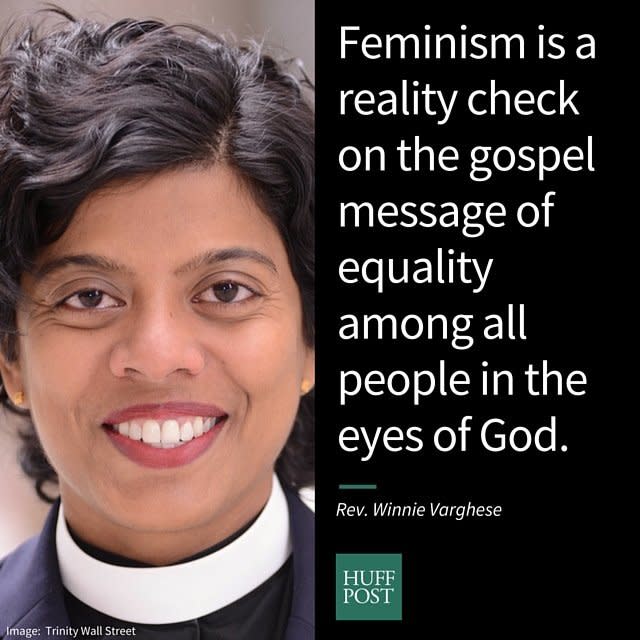
"As a Christian, feminism is a reality check on the gospel message of equality among all people in the eyes of God. If we believe we are equal in the eyes of God, we have to work to make that equality a reality in the world we live in. This has implications both for how girls and women understand their full humanity and dignity and how people of all genders understand the worth and dignity of women, which the church has historically profoundly influenced negatively."
Kate Kelly
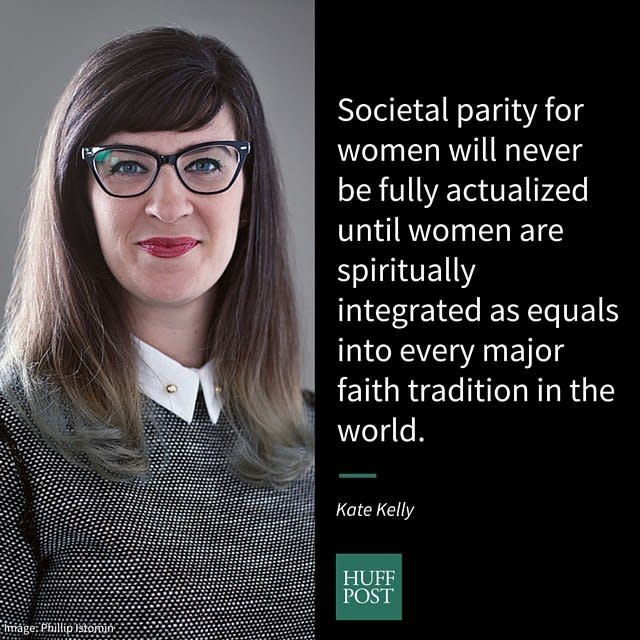
"In my home state of Utah, policy is heavily influenced by the Church of Jesus Christ of Latter-day Saints, which is an extremely patriarchal religion. Any Church that excludes women from leadership roles is clearly missing out on 50 percent of the potential, talents and wisdom of its adherents. But, religious gender discrimination also leaks out of the bounds of the institution and negatively impacts society at large. Utah has one of the largest income gaps between men and women, as well as one of the lowest female college graduation rates. The influence of the religious teachings that put women below men affect not only Mormon women, but all people that live in Utah… Societal parity for women will never be fully actualized until women are spiritually integrated as equals into every major faith tradition in the world."
Emilie M. Townes
![<i>Townes, Dean of Vanderbilt University's Divinity School, preferred to use the word “<a href="http://noteasybeingred.tumblr.com/post/206038114/alice-walkers-definition-of-a-womanist-from-in" target="_blank">womanist</a>,” a phrase coined by poet and activist Alice Walker to embrace the experiences of black feminists. Townes described the term this way: “Womanism is when historic and current insights of Black women are used to eradicate inequalities for all people with a particular focus on class, gender, race, sex and sexuality as social and theological tools to unseat evil.”</i><br /><br />"As a Christian, womanism underscores the power of the gospel working in our lives to set us all free from stereotypes based on gender, sexuality, race, class, physical ability, and all of the ways in which we are humans in God’s creation. Womanism is a spirituality of life that calls me to remember that my life is a gift from God and I should use this gift to work for peace and justice by sharing the good news and to work with others to craft a space and place for folks to thrive. This space and place, to my mind, is the church. It becomes the place that is genuine[ly] involved in being partners with God in bringing in the new heaven and new earth and an embodiment of love, hope, peace, and justice in a world that can use a good dose of each these days."](https://s.yimg.com/ny/api/res/1.2/OQaRo1ArtxbPM5rV6D0jrQ--/YXBwaWQ9aGlnaGxhbmRlcjt3PTk2MA--/https://img.huffingtonpost.com/asset/56faa4391e00009500711902.jpg)
"As a Christian, womanism underscores the power of the gospel working in our lives to set us all free from stereotypes based on gender, sexuality, race, class, physical ability, and all of the ways in which we are humans in God’s creation. Womanism is a spirituality of life that calls me to remember that my life is a gift from God and I should use this gift to work for peace and justice by sharing the good news and to work with others to craft a space and place for folks to thrive. This space and place, to my mind, is the church. It becomes the place that is genuine[ly] involved in being partners with God in bringing in the new heaven and new earth and an embodiment of love, hope, peace, and justice in a world that can use a good dose of each these days."
Gina Messina-Dysert
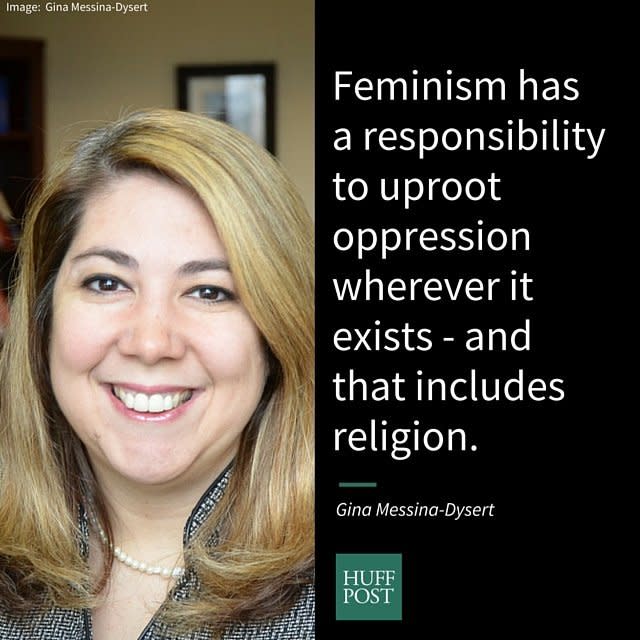
"While many believe the idea of a Christian feminist is an oxymoron, in truth, feminism and Christianity have a long history together. Although, many argue to be feminist is not to be Christian or vice versa, in fact, Christianity has feminist value. If we examine the foundation of the tradition, the idea that every person should be liberated and treated justly, this is very much in line with feminist ideals. Nonetheless, patriarchy has resulted in the manipulation of the tradition into one that has been utilized to oppress women. But with that said, feminism has a responsibility to uproot oppression wherever it exists - and that includes religion. And so, as a feminist lens is used to critique patriarchy in all aspects of society; it is critical that feminists continue to apply the same lens to religious traditions."
Love HuffPost? Become a founding member of HuffPost Plus today.
This article originally appeared on HuffPost.

